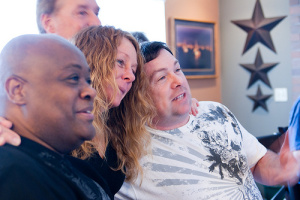Promoting Change Through Education
The Neighbours Friends and Families campaign promotes change through education. Education passes our aims in life and our ways of acting and interacting from one generation to the next. Generally, we learn though any experience that has a formative effect on the way we think, feel, or act. In a narrower, more technical sense, education is a formal organized process which deliberately transmits accumulated knowledge, skills, customs and values from one generation to another.
Neighbours Friends and Families is an education campaign to end woman abuse. It has some key messages that you will hear from us over and over. They are:
- Woman abuse is preventable
- Neighbours, Friends and Families have a crucial role to play in preventing woman abuse
- The Neighbours Friends and Families campaign provides the tools to help
- Communities working together can make a difference in abused women’s and children’s lives
- Talking to abusive men is critical to ending woman abuse
At its core the Neighbours Friends and Families campaign is about relationships. It asks that we pay attention to the people around us. It asks that we learn about warning signs of abuse and that we learn how to have difficult conversations when we see things that worry us. It asks that rather than sitting alone with our doubts and our concerns, we reach out, we break through the isolation and we attempt to develop a relationship. It is a simple idea that challenges some powerful social norms. Instead of minding our own business, turning away because what goes on in a home is private, avoiding questions that are too personal and expecting that everyone should solve their own problems, we are asking everyone to reach out and to ask some simple questions, “Are you okay?” “Do you need help?”. And when someone isn’t ready to talk yet, to keep the door open for the future by saying something as simple as, “I’m here if you need me.”
Neighbours Friends and Families engages the power of everyday relationships, first to teach about warning signs and then to teach how to break through walls of silence that are centuries old. None of us have to be a hero and fix the whole situation, small actions can make a difference.
This way of putting relationships at the centre of learning and at the centre of what we do has great potential for education in formal settings as well.
